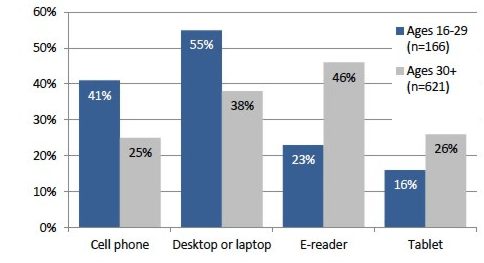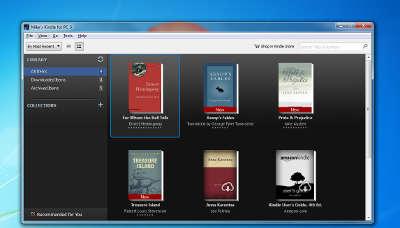| E-Books Not Confined To E-Readers |
| Written by Janet Swift | |||
| Sunday, 18 November 2012 | |||
|
What is the most popular device on which to read an e-book? For the age group 16-29 it's a desktop or laptop.Even among the 30+ age group, desktop/laptop is the second choice of device. This surprising finding comes from further analysis of the Pew Research study we've already reported on which revealed that those who read e-books read more frequently and with a wider range of motivation, that is both for pleasure and for college/work purposes. The latest analysis comes in a report, Younger Americans' Reading and Library Habits, which is based on the same data - a survey conducted in December 2011 with 2,986 respondents aged 16 and over. Pew has looked into the habits of readers aged 16 to 29 because interest in them is high in the context of libraries and publishing. However it is equally interesting to those creating digital content to know what motivates the choice of young consumers' mobile technology. Looking at the survey as a whole more than a quarter of those surveyed had read an e-book in the past 12 months, with the peak age range for doing so being age 30-39. Among 12-29 years olds e-books are most popular with college-aged adults (ages 18-24 years). This Pew report notes that e-content has affected younger American' reading habits making it more likely that they will read in their spare time. Among those with e-readers, they now read more or when traveling and waiting in line. The following chart shows the devices used to read e-books among the 793 respondents who had read an e-book in the past 12-months:
Over half the under 30 group used a desktop or laptop in preference to any other device - although this may be through necessity rather than choice. Cell phone was second choice for this group whereas it ranked bottom for over 30s - again this may just be that most young adults own a cell phone. The least used device overall was a tablet - although it out-ranked the cell phone for the over 30s. Perhaps this will change with the latest generation of Android tablets which have a much more convenient form factor for book reading than the cell phone. Will the tablet displace the e-reader as the choice of device for reading e-books? The ink-on-paper feature of a dedicated e-reader gives it an edge for reading in many conditions - you can read with a Kindle in full daylight for example - but most Kindles don't let you read in the dark whereas tablets usually do. It is probably the case that those consumers who can afford both types of devices will continue to purchase e-readers whereas as more content - games as well as books and magazines - becomes available for tablets consumers who face an either or choice will opt for multi-purpose devices. Will desktop and laptop computers continue to be used for e-books?
Yes, simply because the advantage of e-books for work, study and research purposes - fast access, ability to search, mean that readers will use what device is available. And in a work or college environment the computer is the ubiquitous device, at least in the short term. More InformationYounger Americans' Reading and Library Habits Pew Research: The rise of e-reading Related ArticlesSales of Kindle books outstrip print books
Comments
or email your comment to: comments@i-programmer.info
To be informed about new articles on I Programmer, install the I Programmer Toolbar, subscribe to the RSS feed, follow us on, Twitter, Facebook, Google+ or Linkedin, or sign up for our weekly newsletter.
|
|||
| Last Updated ( Sunday, 18 November 2012 ) |



